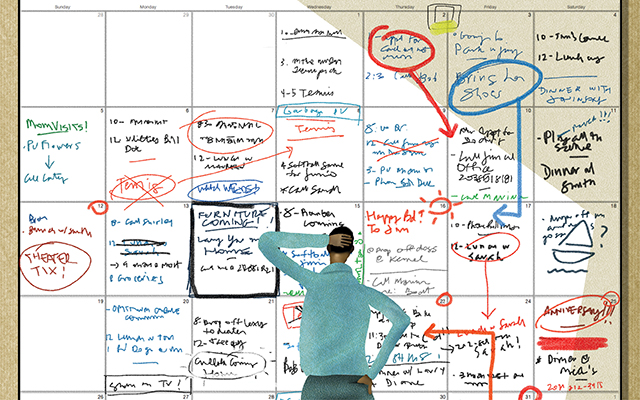David Allen is the bestselling author of Getting Things Done and Ready for Anything. He is a leading authority in developing productivity-improvement programs.
Some days feel like an all-out sprint. From the moment the alarm clock goes off, you hurry from obligation to obligation: Drop off the kids, race to a meeting at the office, squeeze in a workout, run some errands, visit an aging parent. At the end of the day, it’s easy to wonder where time has gone and whether you really have it in you to do it all again tomorrow.
With this much activity crammed into a limited amount of time, you may not feel you have time to breathe, let alone to stop and think for a few moments. And that, says productivity expert David Allen, is precisely why setting aside dedicated time to reflect on your priorities, commitments and project lists is so vitally important — both to your effectiveness and to your sanity.
The previous three parts of this five-part series have focused on Allen’s system for creating “stress-free productivity,” namely collecting all the information and items that relate to your projects; processing their meaning; and organizing your time and space to support a smooth workflow.
The fourth stage in Allen’s system involves reviewing, which basically means scheduling time (daily, weekly, monthly and annually) to pause and think about the things you are too busy to think about on a moment-to-moment basis.
Allen emphasizes the value both of high-level thinking (about how various goals or obligations fit into your life, for example) and of “runway-level” reviews of the various lists and projects in order to give visibility, hierarchy and focus to your ongoing commitments and to-dos.
“If you are feeling driven by the latest and loudest demands, and have the feeling you’re becoming overwhelmed by the details,” says Allen, “it is always healthy to stop, take a breath and rise to survey the situation from a more elevated viewpoint.”
Reviewing your lists allows you to stay current with all your goals and projects, Allen says, which is essential to “keeping them alive.” Reflecting on the status of your obligations helps you maintain a conscious connection to them. You get gratifying evidence that you are moving toward your larger goals — or you get a reality check on how overcommitted you really are. Conducting regular reviews “promotes clarity, creativity and self-trust,” Allen says. But such reflective moments generally don’t happen by themselves. So here’s how to build them into your schedule by choice.
Daily Reviews
Organizing time is not that different from organizing a closet. You can buy an elaborate shelving system with the best intentions, but after a few weeks, you may still find the same haphazard piles of clothes on the floor. It isn’t the fault of the shelves: It’s still up to you to fold the clothes and put them away.
Similarly, Allen asserts, a calendar, project log or to-do list works only to the extent that you interact with and maintain it. “You have to engage with [your lists and calendars],” Allen says, “and not just in a cursory manner, but with sufficient focus to absorb the information in a way consistent with what the data mean to you.” To that end, he recommends the following:
The Morning Review. Conduct a daily inventory of your calendar and current to-do lists each morning, soon after you get up or when you arrive at work. Allen suggests taking a few minutes to go through your appointments and time-sensitive projects, briefly reflecting on each one, considering its urgency and then establishing what actions are required next to move the project forward — whether that’s making a phone call, drafting an outline, attending a meeting or doing some research online. Preparing yourself for what the day has in store makes it easier to allocate your energy effectively. (You’ll learn more about Allen’s concept of “next actions” in the series’ final installment.)
The End-of-Day Review. Allen advises conducting a similar, shorter review at day’s end. Before you begin your wind-down, look over your calendar and key project lists and evaluate where things stand. Take note of any new tasks, as well as any scheduled obligations that didn’t get completed as planned, and write them down for the following day. This releases your mind from trying to retain tomorrow’s commitments and lets you fully relax before going to bed.
Weekly Reviews
While daily reviews are critical to staying on track with your projects, Allen believes it’s also essential to set aside a chunk of time each week for deeper reflection. This allows you to consider commitments and plans with a strategic mindset that daily check-ins don’t allow.
Allen suggests scheduling a two-hour block into your calendar at the end of each week for this more comprehensive review. An ideal time is early Friday afternoon, when the waning week is still fresh in your mind but you’re not yet completely out of gas. This window of time also gives you an opportunity to delegate or renegotiate commitments before colleagues and collaborators take off for the weekend.
“This once-a-week exercise allows you to regroup and refresh your world,” he says. “Trusting that you have a slot of time [for reviewing] will allow you to be more relaxed,” he says, “knowing that you have a window available in which you’ll be able to catch up.”
You can begin your two-hour review period by cleaning up any physical clutter that’s accumulated over the week, like the contents of an overflowing inbox or teetering stacks of mail. Having the time to gather and process this stuff allows you to start your weekly review with a clear mind.
Then, Allen says, go through your lists and evaluate where you stand with various projects. Be sure to cross off what you’ve finished first, then establish what’s still ahead, what needs to be prioritized in the coming week and so forth.
Spending this sort of unpressured review-and-reflect time is essential to driving your projects rather than letting them drive you, says Allen. It prevents details from escaping into the ether, and it allows you to do the kind of strategic game-plan thinking you rarely have time to accomplish while in the midst of the playing field.
Allen says the people who are most successful in implementing his system and sticking with it over time are the ones who schedule weekly reviews consistently. To the extent you follow their example, he asserts, you’ll start trusting yourself and your systems more. You’ll know that your time commitments match up with your priorities — because you’ve given yourself time to think about what you’re doing.
Periodic Reviews
In addition to daily and weekly reviews of what’s happening on the ground, Allen also advocates for occasional higher-level reviews at, say, the 10,000-, 20,0000- or 30,000-foot level. This is the big-picture realm of key roles, goals, values and life priorities.
You might conduct these on a monthly, quarterly or annual basis, or whenever a major shift or life-changing event occurs. Ultimately, you want to do them as often as you need to feel confident that you are focused on the right priorities and giving them the right resources at the right time.
The final installment of this series will explain how to leverage all the previous stages to execute effective, goal-supportive actions. In the meantime, the more regularly you thoughtfully review your commitments and lists, Allen promises, the more freedom and confidence you’ll feel in using these “external hard drives” to offload repetitive thoughts and worries currently taking up space in your brain. And the more productivity and peace of mind you’ll enjoy as a result.




This Post Has 0 Comments